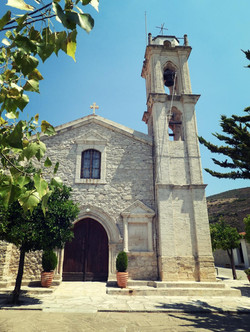Life in Lania
- Sep 1, 2020
- 4 min read
Updated: Aug 22, 2021
Lania is a scenic village on the way to Troodos, around 25 km from Limassol. It is renowned for its grape vines and wine-making in this area of Troodos. The name 'Lania' may come from 'Lana', who was the daughter of Dionysos, the mythological Greek god of wine. Another theory suggests it is related to the word for acorn, 'valania'. The oak tree is common in this region and is the emblem of Lania. The most famous oak in the vicinity is the 'Royal Oak' which is some 800 years old, but unfortunately only a stump remains after it withered and broke up in the mid-1990s. The name is a reference to King Farouk of Egypt who was on holiday in the area at the time of British rule. The picture is all that remains today of the once magnificent 'Royal Oak' which formerly served as a resting stop in the shade, complete with a café and snack stand in latter years.

Lania Tavern is at the entrance of the village close to the village fountain. An interesting feature of the village is the old pictures posted on walls, recalling scenes of the locals from the 20th century. I was surprised to see a wall built through the trunk of an old olive tree, captured in the bottom picture of the collage.
As in most Cypriot villages, the bright bougainvillea and other vegetation add a colourful welcome to many homes.
Some of the earthenware pots which stored the wine are on display in the 'Thematic Museum of Commandaria' featured in the pictures below, as well as the local library. It is a 'help-yourself' styled library with a system of trust rather than the normal lending scheme.
An old shoemaker's room exhibits an ancient trade which was undoubtedly an integral part of village life in past centuries. The lenos (wine press), pictured below, was built in 1822 and was mainly used to make commandaria, a sweet dessert wine from the time of the crusaders. It is the only wine press remaining from seventeen which were in use until the mid-20th century.
Normally I enjoy photographing the old doors of the villages, but someone has been there before me and has made a poster of Lania's doors and gates! The church in the village centre testifies to Eastern/Greek Orthodox tradition.
My visit to Lania was at lunchtime when the shops appeared to be closed. I recall the aroma of roasting lamb and potatoes wafting through open windows as I walked along the cobbled streets.
Village life is relaxed and peaceful. A moped is the most practical way of manoeuvring around the narrow streets. The Platanos Tavern-Café on the main square is an ideal spot to have a refreshment under the shade of leafy trees.
Irrespective of which village you visit in Cyprus, there is always a vibrant selection of flowers on the way!
As I walked back to the car after my walk round the streets of Lania, I was mulling over the photos of yesteryear. It was moving to see the faces of past generations who once had lived in the houses lining the streets. I wondered what their lives had entailed. No doubt, there would have been much physical labour in producing wine, olive oil or agricultural products to be sold in the locality.
The time spent in this historical village reminded me of what the Bible says about life:
For what is your life? It is even a vapour that appears for a little time and then vanishes away'. James 4:14.
It is very unlikely any of us will be here in a hundred years from now. Where will we be?
What I have learned from reading the Bible is that eternity awaits us all. The Lord Jesus conquered death on the cross and rose from the dead that we might live eternally with Him.
In order to be saved from the wrath to come, we need to repent of our sins and call on His name:
... if you confess with your mouth that Jesus is Lord and believe in your heart that God raised him from the dead, you will be saved. For with the heart one believes and is justified, and with the mouth one confesses and is saved. Romans 10:9-10
Paul wrote words of wisdom to the believers in Ephesus:
Look carefully then how you walk, not as unwise but as wise, making the best use of the time, because the days are evil. Therefore do not be foolish, but understand what the will of the Lord is. Ephesians 5:15-17
May we call on His name for salvation and do His will during our short lives on this earth, regardless of our geographical location. Life is a precious gift from our Creator and we owe each breath to Him!
King David summed up the sentiments of life's brevity in his writings:
Behold, you have made my days a few handbreadths, and my lifetime is as nothing before you. Surely all mankind stands as a mere breath! Selah Psalm 39:5
We can say with Moses, 'teach us to number our days that we may gain a heart of wisdom!' (Psalm 90: 12)



















































































Comments